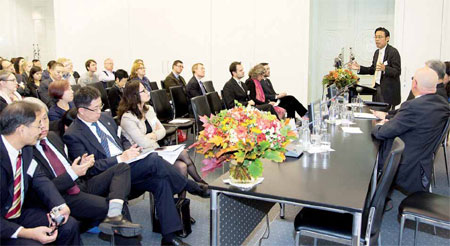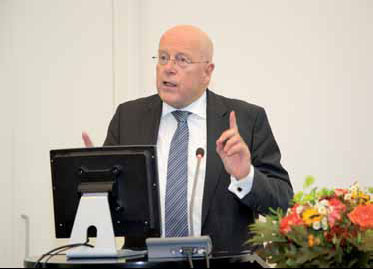作者: 发布时间:2013-11-18 来源:复旦发展研究院+收藏本文
Two cities draw on each other's resources to renew friendship
You would be hard pressed to find a more identical pair of non-identical twins. On one side is Shanghai, straddling the mighty Huangpu River, which acts as one of its chief economic arteries. On the other side is Hamburg, sitting astride the Elbe, which acts similarly for the German port city.
Shanghai is now reveling in worldwide attention as it goes about setting up a free trade zone, and the German city glories in its official title, the Free and Hanseatic City of Hamburg, commemorating among other things its place in a powerful trading bloc of the late Middle Ages.
The two metropolises, which have officially been twin cities for more than 27 years, also rank in one way or another as their respective countries' second-largest cities.
And they have at least one other thing in common: both have brains. As a result, a large part of the twin-city agreement that the pair signed in 1986 is concerned with education. That aspect of the relationship is about to get a fresh injection with work that universities in both cities are doing together.
Fudan University in Shanghai says more academic research into Sino-German history, culture and society is likely be carried over the next five years in conjunction with the University of Hamburg.
The universities have already started work on some projects, such as one on ancient Chinese manuscripts and Buddhist studies, said Dr Zhang Ke, an assistant professor at Fudan University.
The two universities will have a joint program for doctoral students from next year that will allow five students to spend one year doing related studies in each other's countries, Zhang said.
Scholars in China have done extensive study of Sino-Germany relations, history and culture in recent years and are said to have produced work of immense value.
Sino-German historical diplomatic documents were exhibited during a Shanghai-Hamburg Forum at Fudan in April, which had the theme Germany in China: Ideas and Technology.
More than 300 kinds of firsthand German historical items were collected by Wang Weijiang, a history professor at Fudan. They were records kept by Germans in the 19th century that portrayed the social characteristics of the China of the day.
An influx of Germans including diplomats, missionaries, businessmen, scholars, journalists and writers began in the early 1860s.
"They left behind many words and pictures, recording a China from different perspectives, and also their attitudes and thoughts towards the country and its culture," Wang said.
Historical documents in German have tended to be less used in historical research in China, and are now proving their value, experts have said.
"These historical data not only convey a broad view of Sino-German relations, but also put the two countries' exchanges in a new light," Wang said.
This month the second Shanghai-Hamburg Forum was held at the University of Hamburg, with the theme China in Germany: Education, Media, Culture and Urban planning.
The forum emphasized the importance of the two sides working closely together, and organizers said lectures and discussions illustrated how China and Germany have influenced each other, and not just recently on the basis of economics.
The forum was named after Gottfried Wilhelm Leibniz (1646-1716), one of the greatest German mathematicians and philosophers.
Jin Guangyao, a history professor at Fudan, said: "He was believed to be the earliest German doing research on Chinese philosophy, and Chinoiserie, a China-inspired artistic style, became extremely popular with the German aristocracy of the 18th century."
At the forum, Jin gave a lecture titled China in 1968: From the Red Guard Movement to the Countryside Movement. That talk was complemented by Dr Wolfgang Kraushaar of the Hamburg Institute of Social Science with a lecture about the adoption of the "cultural revolution" (1966-76) in the protest movement in Germany in 1968.
Other lectures and discussions covered living space, population growth, rising housing costs and urban planning.
Juergen Bruns-Berentelg, head of urban planning for HafenCity Hamburg GbmH, which is owned by the city of Hamburg, demonstrated how a newly built quarter in the city aims to combine living space, working space and environmental sustainability.
The next two Shanghai-Hamburg Forums are to be held in Shanghai in April 2015 and in Hamburg the following October.

